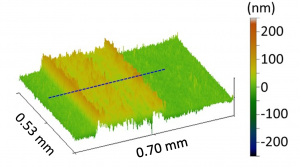The Carpick Research Group is partnering with Pixelligent Technologies and the Argonne National Laboratory to create self-assembling nanocomposites for use in advanced lubricants, thanks to a $1.8 Million grant from the U.S. Department of Energy’s Advanced Manufacturing Office.

Robert Carpick, John Henry Towne Professor in the departments of Mechanical Engineering and Applied Mechanics and Materials Science and Engineering, is an expert on nanotribology, the atomic-scale study of friction, wear, and other phenomena that arise at the interface between two surfaces.
For example, lubricants containing specially designed nanoparticles can use the forces involved in two surfaces sliding against one another to bond those nanoparticles together into protective films.
Pixelligent, which leads the project, makes nanoparticles that can be added to lubricants, creating self-assembling films that adhere to metal surfaces, improving energy efficiency and reducing wear. They are especially useful in harsh environments, including wind-turbine gearboxes, wheel bearings in electric vehicles, marine components, steel and aluminum rolling plants, and space-related applications.

“We have partnered with Pixelligent for the past five years on multiple advanced lubricant programs sponsored by the US Departments of Energy and Defense,” says Carpick, “Our development work to date has helped demonstrate the potential energy efficiency impacts of embedding their PixClear zirconia nanocrystals in various lubricants. The performance is unsurpassed in terms of rapidly forming protective anti-wear films on surfaces.”
Read more at Pixelligent.
